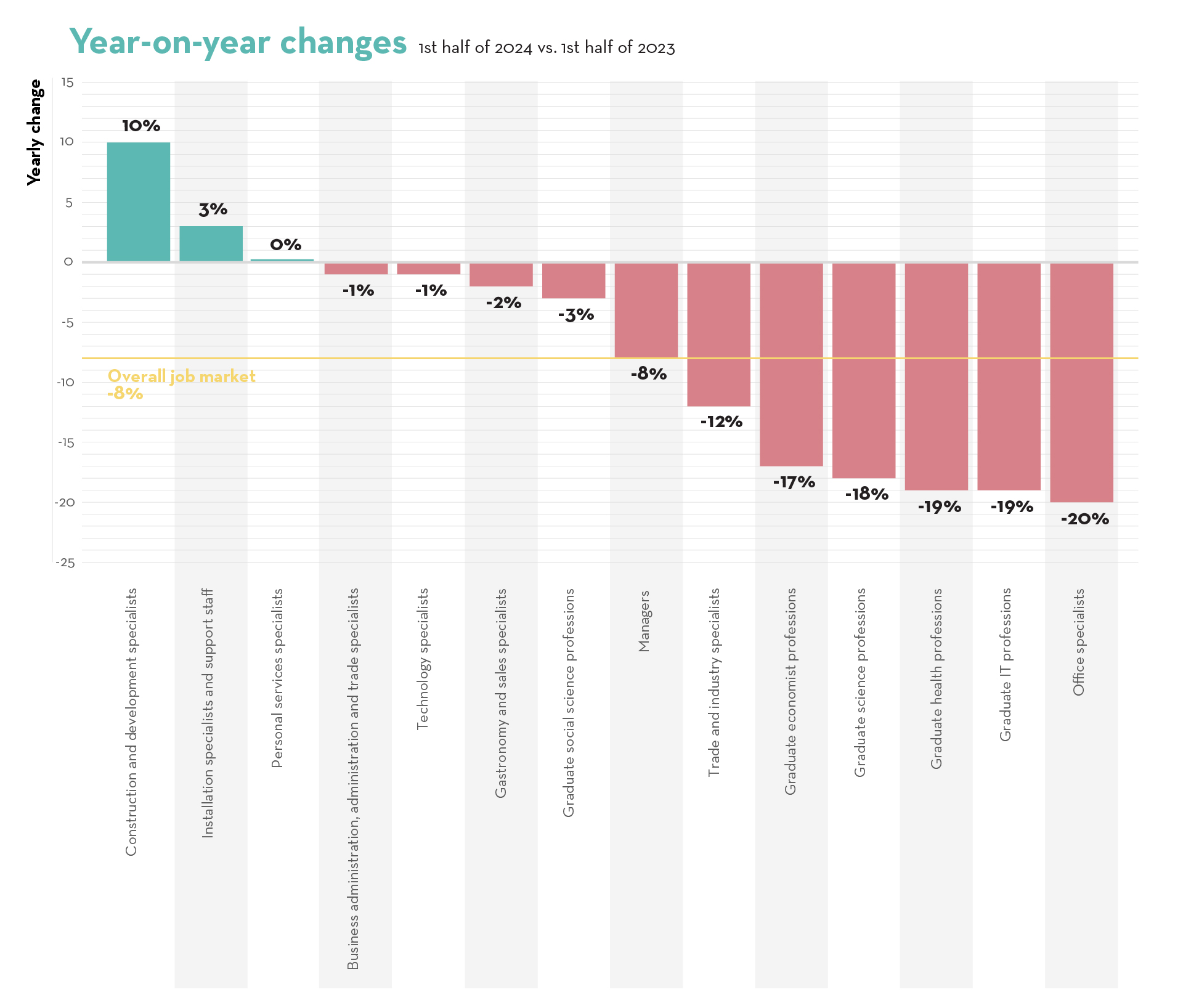Swiss job market: cooling down, but labour shortages remain

After several years of acute labour shortages, is the Swiss job market on its way towards a reprieve? Not quite, say analysts.
Especially since the Covid-19 pandemic, the Swiss job market has been haunted by the spectre of labour shortages. As companies struggled to recruit, the number of open vacancies rose to a 20-year high, the unemployment rate fell to a 20-year low, and fears for future prosperity abounded.
Is the trend shifting? Figures published this week by the Adecco HR group and the University of Zurich confirm that it’s at least turning slightly: from the first to the second quarters of 2024, the number of unfilled vacancies fell by 8%, they write; year-on-year, the drop was 11%.
“Office specialists” – i.e. secretarial or administrative positions – were most affected, with 20% fewer open positions than a year ago. Other white-collar roles like IT specialists (-19%) and economists (-17%) also saw a dip in demand, as did healthcare workers (-19%).

And even if in some professions the labour demand remains high – e.g. construction and related trades – the overall picture is of a return towards a pre-Covid situation, says Yanik Kipfer from the University of Zurich, who was involved in compiling the index.
“[The trend] is not surprising, given that the economy is not booming to the same extent as after the pandemic,” Kipfer says. “When things opened up again, people wanted to go out, travel, and this sparked fresh demand, which meant new job openings; since then, there has been a decrease in economic activity”. The current slow-down in the labour market is thus something of a “normalisation”, he says.
Want to read our weekly top stories? Subscribe here.
Snapshot
As for how far the normalisation will go, or how long it will last, Kipfer can’t speculate. Adecco’s job market index is simply a “snapshot” of the current state of affairs, he says.
Michael Siegenthaler from the KOF Swiss Economic Institute at the federal technology institute ETH Zurich agrees that the situation is “somewhere between a cooling and a normalisation”. But he doesn’t expect it to become a downturn. By historical comparison, Siegenthaler says, all labour market indicators are still at relatively high levels. And while firms are reporting fewer difficulties in recruiting, comparatively many are still reporting difficulties.
Meanwhile, he adds, the recent “dichotomy” that saw many export-oriented sectors struggle and many service-oriented sectors boom (while struggling to recruit) should level out somewhat in the next quarters.

Mehr
Why Switzerland needs workers from abroad
Long-term problems
Overall, Kipfer and Siegenthaler say, the longer-term structural issues leading to labour market shortages are not going to go away – notably the ageing of the population and the job vacancies resulting from unreplaced retirements in the coming years.
As we wrote recently, various studies estimate that the Swiss job market will lack between 430,000 and 1.2 million workers by 2050 – a prospect which has sparked debates about state intervention in vital sectors, more family-friendly social policies, and notably immigration.
Last year alone, 68,000 people came to Switzerland from European countries, spurred by the booming job market. Since 2002, when the free movement of people agreement with the European Union (EU) came into force, non-Swiss workers have risen from 24.6% to 33.8% of the labour force. And with the population having risen by 20% to nine million over the same period, politicians are becoming more and more worried about the rapid growth.
The right-wing Swiss People’s Party, as the most obvious example, is gathering signatures for its initiative to curb the population at 10 million. However, across the political spectrum, concerns about the impact of immigration are rife: political analyst Michael Hermann told Swiss public broadcaster, SRF, earlier this year that he has “never seen immigration come under so much pressure – from right to left”.

Mehr
Work permit in Switzerland
More of the same?
But when it comes to the job market, Siegenthaler doesn’t expect any major slowdown in demand for immigration in the coming years.
Numbers of arrivals could drop a little to keep pace with the labour market cooling, he says. But they should still remain at a high level. As firms struggle to recruit, it’s not surprising that they look abroad, whether it’s for highly-qualified specialists or for construction workers.
And with the Swiss labour market characterised by stably high wages and its small size, it should be able to stand its ground in any looming talent war with neighbouring countries, Siegenthaler reckons. He predicts a net migration of foreigners of between 60,000 to 80,000 in the coming years.
As for where they are all going to work, there are no shortage of sectors. Kipfer singles out healthcare: as the population ages and immigration continues, the long-term demand there will continue to rise – in turn driving the need for more medical staff, he says.
Another sector is equally clear: construction, currently showing the biggest increase in vacancies, is only going to see bigger growth in the future, Kipfer says. After all, immigrants need somewhere to live, and Switzerland is already facing housing shortages.
Edited by Reto Gysi von Wartburg
Mehr

In compliance with the JTI standards
More: SWI swissinfo.ch certified by the Journalism Trust Initiative










You can find an overview of ongoing debates with our journalists here . Please join us!
If you want to start a conversation about a topic raised in this article or want to report factual errors, email us at [email protected].